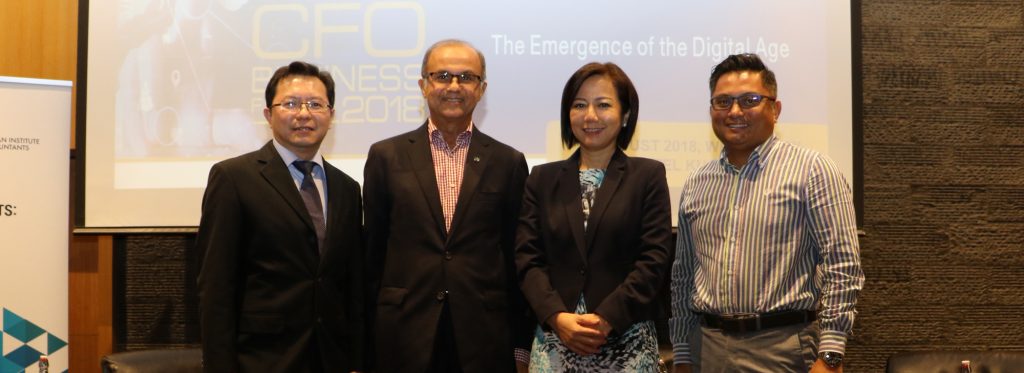By Anis Ramli
It’s not easy being a CFO in today’s complex landscape, where the traditional role of financial steward has evolved into that of co-pilot and business partner.
“The role of CFO, as the leader and senior person involved in the finance function of an organisation is very important to drive the organisation forward in achieving its goals,” said MIA CEO Dr. Nurmazilah Dato’ Mahzan at the MIA Regional CFO Forum 2018.
To enhance CFO competency and effectiveness, MIA has released a CFO Competency Framework for Public Interest Entities (PIEs) with the aim of upskilling CFOs to operate in the highly-regulated PIE environment where good governance and protecting public interest is paramount.
The Framework is extremely timely, given the new government’s focus on good governance, and will guide organisations on how to appoint the right CFO. “The CFO Competency Framework seeks to enlighten those charged with governance (TCWG) and C-suite executives that a competent finance function led by a competent CFO can improve corporate governance and hence, strengthen reputation, public confidence and trust,” added Dr. Nurmazilah.
Setting Baseline Competencies
By clarifying and delineating the scope of work that CFOs in PIEs could be doing and the competencies that are expected to go with it, the Framework can serve as a reference guide for companies, Audit Committees and CFOs on how to optimise the finance function and finance leadership to benefit all stakeholders.
At the Forum, moderator Simon Tay Pit Eu, Executive Director Professional Practices and Technical, MIA explained the Framework’s five key principles guiding the roles and expectations of a CFO and the six roles that represent the full breadth of the CFO’s remit.
Using IFAC’s five key principles as a guide, the PIE CFO’s roles and expectations are to:
- Be an effective organisational leader and a key member of senior management
- Balance the responsibilities of stewardship with business partnership
- Act as the integrator and navigator for the organisation
- Be an effective leader of the finance and accounting function
- Bring professional qualities to the role and the organisation.
In defining the roles of a CFO in a PIE, MIA also looked to the definition set out by Ernst & Young (EY) as a guide. These roles are:
- Ensuring business decisions are grounded in sound financial criteria
- Providing insight and analysis to support the CEO and other senior managers
- Leading key initiatives in finance that support overall strategic goals
- Leading key funding, enabling and executing strategy set by the CEO
- Developing and defining the overall strategy for your organisation
- Representing the organisation’s progress on strategic goals to external stakeholders.

Applying the Framework
During a panel discussion at the Regional CFO Forum, Teresa Chong, Audit Partner, KPMG PLT Malaysia said that the Framework is very comprehensive and spells out the required skillsets for CFO competency. She added that applying the CFO Competency Framework will ultimately improve corporate governance and public trust. “Accountability and public trust are key to auditors. With so much information shared with the public, there is a need to verify the reliability of the information, whom we can trust and who’s preparing it.” Put another way, implementing the Framework will heighten public trust in CFOs as purveyors of financial information.
Jeremy Nasrulhaq, Chairman, Professional Accountants in Business Committee, MIA, recommended that CFOs embrace technology to become future-proof. “The emergence of the digital age is very relevant to the CFO. You need to keep up to date with all the developments that are coming up in the future. CFOs should know what is happening in Fintech, AI (artificial intelligence), etc.”
To ensure that CFOs can lead strategically, Dr. Farouk Abdullah, Chief Data Scientist and Country Head, Natural Intelligence Solutions -LLOOPP advised CFOs and organisations to transform the finance function by leveraging four forces: digital, data, risk and uncertainty.“The CFO mindset needs to change. You can have all the strategy in the world but if the culture that you drive within your financial department does not change, it will be difficult to move forward in the digital world.”
“CFOs should be the custodian of data and analytics within the organisation,” recommended Dr. Farouk. “You don’t own data, but you are in charge of the data governance, data dictionary, where and how the data is stored, who uses and have access to the data and what decisions are made on the back of the data – basically the whole data ecosystem from point of capture to storage to use and to cleanse.”The CFO basically needs to manage data in real time and to collaborate with the different departments to inform them on how to achieve the organisation’s targets.
In short, CFOs should be the “lubricant” of the company – “the one that gets things going and moving forward. The best way to embrace technology and drive the technology agenda is to understand what the vision of the company is and where it hopes to be in the future,” said Dr. Farouk.
Competencies – Other Required Training
Other than emphasising technology, the CFO Competency Framework for PIEs recommends that CFOs undergo training in the following core competencies:
Preparation of financial statements and external reporting in compliance with accounting standards and relevant laws and regulations as befits the local context.
Financial management, strategy development and execution, and communication with stakeholders.
MIA will continue to provide the necessary and tailored CPE to help CFOs bridge competency gaps and prepare for their expanded roles. For a start, MIA recommends that CFOs undertake a minimum of 20 credit hours of structured and verifiable CPD learning for each calendar year.
MIA is also planning to offer more support to CFOs from the vantage of the capital market, in terms of professional development and education in core areas such as business valuation, capital market financing solutions and integrated reporting.






